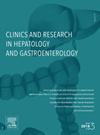端粒甲基化基因:肝细胞癌的新型预后生物标志物
IF 2.6
4区 医学
Q2 GASTROENTEROLOGY & HEPATOLOGY
Clinics and research in hepatology and gastroenterology
Pub Date : 2025-01-01
DOI:10.1016/j.clinre.2024.102516
引用次数: 0
摘要
背景:由于端粒长度和DNA甲基化都与肝细胞癌(HCC)的预后相关,端粒甲基化基因可能成为HCC预后的新标志物。方法:本研究首先通过孟德尔随机化分析研究HCC端粒长度与DNA甲基化之间的相互作用。随后,本研究利用TCGA-LIHC队列技术鉴定HCC中端粒甲基化基因,并探讨这些基因在HCC肿瘤微环境中的表达模式及其潜在机制。最后建立基于这些基因的HCC风险评分模型和预后模型,并对模型的性能进行评估。结果:发现端粒长度和DNA甲基化在HCC中存在双向关系。共鉴定出50个端粒甲基化基因,其中与预后相关的端粒甲基化基因与HCC肿瘤微环境中的Treg和tproif细胞亚群密切相关。端粒甲基化基因可能通过调节染色体稳定性和细胞周期影响HCC患者的预后。此外,构建的风险评分模型和预后预测模型的临床适用性较强,从受试者工作特征曲线、决策曲线分析和校准曲线均可看出。结论:本研究阐明了端粒甲基化基因作为HCC预后生物标志物的潜力,为HCC患者预后和治疗管理的新方法铺平了道路。本文章由计算机程序翻译,如有差异,请以英文原文为准。

Telomere-methylation genes: Novel prognostic biomarkers for hepatocellular carcinoma
Background
Since telomere length and DNA methylation both correlate with hepatocellular carcinoma (HCC) prognosis, telomere-methylation genes could be novel prognostic markers for HCC.
Method
This study first investigated the interaction between telomere length and DNA methylation in HCC through Mendelian randomization analysis. Then, this study identified telomere-methylation genes in HCC by employing the TCGA-LIHC cohort, and explored the expression patterns of these genes in the tumor microenvironment of HCC and potential underlying mechanisms. Finally, the HCC risk-scoring model and prognostic model based on these genes were established, and the performance of the model was assessed.
Result
The findings revealed a bidirectional relationship between telomere length and DNA methylation in HCC. Fifty telomere-methylation genes were identified, and the prognosis-related telomere-methylation genes were closely associated with Treg and Tprolif cell subsets within the HCC tumor microenvironment. Telomere-methylation genes could potentially impact the prognosis of HCC patients by modulating chromosome stability and regulating the cell cycle. Additionally, the constructed risk scoring model and prognostic prediction model showcased compelling clinical applicability, as evidenced by the receiver operating characteristic curve, the decision curve analysis, and the calibration curves.
Conclusion
This study elucidated the potential of telomere-methylation genes as prognostic biomarkers for HCC and paves the way for novel approaches in prognostication and treatment management for HCC patients.
求助全文
通过发布文献求助,成功后即可免费获取论文全文。
去求助
来源期刊

Clinics and research in hepatology and gastroenterology
GASTROENTEROLOGY & HEPATOLOGY-
CiteScore
4.30
自引率
3.70%
发文量
198
审稿时长
42 days
期刊介绍:
Clinics and Research in Hepatology and Gastroenterology publishes high-quality original research papers in the field of hepatology and gastroenterology. The editors put the accent on rapid communication of new research and clinical developments and so called "hot topic" issues. Following a clear Editorial line, besides original articles and case reports, each issue features editorials, commentaries and reviews. The journal encourages research and discussion between all those involved in the specialty on an international level. All articles are peer reviewed by international experts, the articles in press are online and indexed in the international databases (Current Contents, Pubmed, Scopus, Science Direct).
Clinics and Research in Hepatology and Gastroenterology is a subscription journal (with optional open access), which allows you to publish your research without any cost to you (unless you proactively chose the open access option). Your article will be available to all researchers around the globe whose institution has a subscription to the journal.
 求助内容:
求助内容: 应助结果提醒方式:
应助结果提醒方式:


